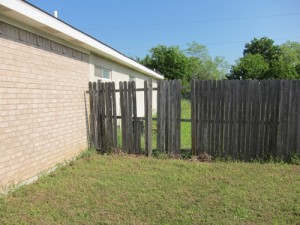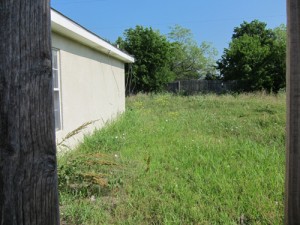Some tenants who live in substandard housing don’t know their rights under their state law.
Once they find out, it’s a whole new ballgame.
Tia Anderson, a school bus driver and the mother of four small children, is more fortunate than most. She hired a lawyer who does.
Marty Leewright took her case because, he says, “it’s just one of those cases that cried out for justice.”
In January, Anderson, her husband and their children moved into a 1,400-square-foot home in a quiet Fort Worth, Texas neighborhood. Monthly rent was $875.
The house had serious problems, but the landlord, Wali Harris, and his wife, Denise Webb, of Grand Prairie, Texas promised they would fix things.
The yard fence was down. The ceiling and walls had holes, and water leaked in. The back yard had a 54-inch hole from an old water well.
Then it got worse.
After a leaking pipe was discovered, Fort Worth turned off the water. Anderson says she lived for four weeks in the house without running water. Her husband often works out of town on road construction projects, so every day, she carried jugs of water she got from a neighbor.
Her 3-month-old daughter got bacterial pneumonia and was in the intensive care unit. A second child also ended up ill in the hospital. The source of the illnesses is unknown, but mildew and mold that city inspectors found inside the house certainly didn’t help.
City inspectors also found other violations: holes in exterior walls, a leaking roof, an outside water leak, exposed wiring, missing electrical-outlet covers and that hole in the yard.
Anderson asked the landlords to make repairs. But she said they told her it was her problem. Texas law is clear, though: Landlords are responsible for making sure housing meets minimum health and safety standards.
This is the second time this happened. The previous tenant, Temilya Harrison-Barcliff, contacted me after she read my original report in the Dave Lieber column in the Fort Worth Star-Telegram. She lived in the house before Anderson and said she “suffered the same fate myself.” She endured severe migraine headaches and had trouble breathing because of the mold growing inside the house.
“All of these conditions were brought to Mr. Harris’ attention,” she said. She, too, had a court date, but she said she missed it because the court officer informed her of the wrong date.
In Anderson’s case, when Fort Worth officials saw Anderson’s lease, they told her it was no good because the tenant’s name wasn’t listed. Anderson asked for a second lease. She later learned that Denise Webb had signed Anderson’s name on it.
Anderson contacted Leewright, a lawyer who usually represents landlords who belong to the Apartment Association of Tarrant County. Since this landlord is not a member, he can represent her.
He told Anderson how to send the landlord a certified letter requesting the repairs. When that didn’t work, he sued on the family’s behalf in landlord-tenant court, which is held in Justice of the Peace court.
The next day, Anderson found an eviction notice on her door. Among the reasons cited in the eviction notice: “for falsely accusing us of forgery” and “for the lawsuit.”
That didn’t matter to Anderson because she had already moved out. But Leewright believed that the landlord had violated the state law that says “a landlord may not retaliate against a tenant” for suing.
At a one-hour trial this month in Justice of the Peace Sidney Thompson’s Precinct 8 courtroom, the landlords defended themselves without a lawyer.
They said the problem with the water happened because Anderson never moved the water account to her name. She said she thought she had.
When the judge learned that Webb had signed Anderson’s name on the lease, he said: “Hold on! Every grown person knows you don’t sign another person’s name.”
“It was an honest mistake,” Webb testified.
Harris testified that he didn’t have the money to make the repairs because he had been hospitalized for a while and had been unable to work.
The judge asked the landlords whether they worried that children could have fallen into the hole in the yard.
Wali Harris said he didn’t see it as a problem because he had always mowed around it and a tree was growing out of the hole.
“We are not slumlords,” Denise Webb told the judge. She also said she and her husband planned to make the repairs.
The verdict? The landlords were ordered to pay the tenant $6,800, court costs and $3,000 in lawyer fees.
The next day, the eviction hearing was held in the same courtroom. The landlords didn’t show up. The eviction was dismissed, and Anderson was awarded $4,325 more. The landlords now owe about $14,000 to their former tenant.
They told me they will appeal to county court.
State law changed this year to allow Texas tenants, who can go to landlord-tenant court without a lawyer, to ask for repairs that cost up to $10,000.
Sometimes judgments aren’t paid, but Leewright told me about a way around that.
Texas law allows for repossessing property when outstanding judgments aren’t paid.
Leewright told me about one case he had in which a landlord didn’t pay a $6,500 judgment. The house was worth $149,000.
“I seized the house, and it was sold on the courthouse steps for $1,000,” Leewright said.
That landlord later filed for bankruptcy so the lawyer couldn’t seize a second house to pay the rest of the judgment.
Almost everywhere in the United States, tenants often have far more rights than they know of.
# # #
Read what Texas Attorney General Greg Abbott says about state tenant laws here.
Read what the State Bar of Texas says about tenants’ rights here.
# # #
Dave Lieber, The Watchdog columnist for The Fort Worth Star-Telegram, is the founder of Watchdog Nation. The new 2010 edition of his book, Dave Lieber’s Watchdog Nation: Bite Back When Businesses and Scammers Do You Wrong, is out. Revised and expanded, the book won two national book awards in 2009 for social change. Twitter @DaveLieber







